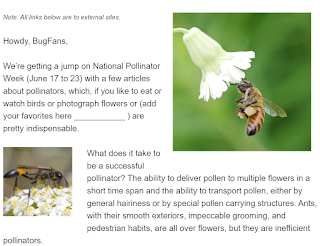Closed for June 2 — Pollinators
Hello, Environmental Activists and Concerned Citizens,
We’re kicking off the celebration for National Pollinator Week (June 17 to 23) with a series of articles focusing on the essential role of pollinators. Whether you enjoy gardening, watching birds, or simply savoring your favorite fruits and vegetables, pollinators play a crucial role in our everyday lives.
Exploring Pollinator Success
What makes a successful pollinator? It requires the ability to efficiently transport pollen across multiple flowers in a short period. This is facilitated by hairy bodies or specialized structures. Ants, for instance, with their smooth bodies and meticulous grooming habits, are commonly seen around flowers but are inefficient as pollinators.
Flies, another ubiquitous presence in the floral world, are also key pollinators. Check out this article from the Smithsonian to learn more about their importance.
How Pollinators Navigate
Pollinators locate flowers through various signals. These include color, UV reflections, patterns that act as nectar guides on petals, electrostatic charges, and the size and shape of flowers. Specialized flowers have evolved to "train" specific pollinators over millennia. Scent is particularly crucial for nocturnal visitors. What happens when these vital cues are disrupted?
The Honey Bee Dilemma
There has been much discussion in recent years about the decline of honey bee colonies. Honey bees are responsible for pollinating about one-third of our food, contributing around $15 billion annually to crop values, in addition to producing honey and beeswax. However, honey bees are not native to our ecosystems; they were introduced to pollinate non-native crops. This raises questions about their impact on native bee species and their relationships.
FAQs:
Why are honey bees considered alien bees? Honey bees are not native to North America; they were imported to pollinate non-native crops.
Do honey bees disrupt native bee relationships? Yes, the presence of honey bees can impact the foraging and habitat of native bee species.
#PollinatorWeek #NativeBees #HoneyBees #EnvironmentalAwareness #PollinatorProtection

